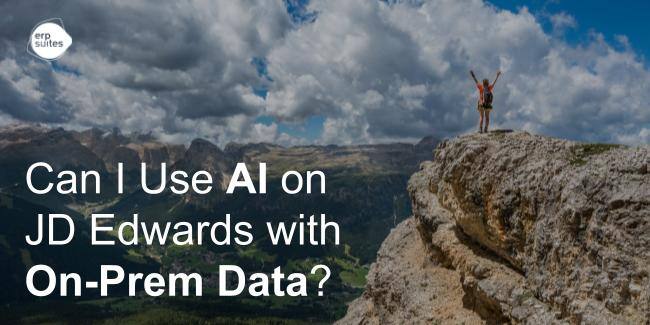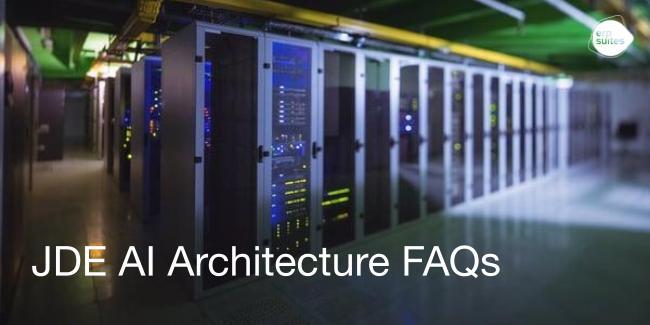Can I Use AI on JD Edwards with On-Premises Data?
December 27th, 2024
4 min read

Are you struggling to unlock the benefits of AI for your JD Edwards system because your data is hosted on-prem? AI offers transformative opportunities for smarter workflows, enhanced decision-making, and operational efficiency. However, many believe that to leverage cloud-based AI services like Oracle Cloud Infrastructure, all their data needs to be in the public cloud.
This isn’t true. Companies with on-premises or private cloud data can still use AI in JDE through a hybrid approach.
At ERP Suites, we’ve helped numerous businesses like yours navigate these challenges, demonstrating that AI can be implemented through a hybrid cloud approach. This combines the flexibility of cloud AI with the security of on-prem data hosting.
In this article, we’ll explore how companies with on-premises or private cloud data can still use AI in JDE through a hybrid approach.
Another option we won't discuss in this article is developing your own on-prem AI solutions but that has many challenges. This article will focus on using existing AI services, such as those available from OCI or AWS.
Leverage AI Services Through a Hybrid Cloud Approach
If you want to use public cloud AI services, you need to have data in that cloud. This doesn’t mean you have to migrate your entire environment to the cloud. By selectively choosing data to transfer, businesses keep their on-prem or private cloud infrastructure while taking advantage of public cloud AI services.
What is a Hybrid Cloud Approach?
A hybrid cloud approach integrates on-premises or private cloud data with public cloud AI services. This allows businesses to keep their data in their current environment while accessing the advanced capabilities of cloud-based AI.
How Hybrid Cloud Bridges JD Edwards and Cloud AI Models
In a hybrid cloud setup, your data stays on-premises or in a private cloud. Cloud services, like Oracle Cloud Infrastructure (OCI), are used to build, train, and run AI models. Once trained, they interact with on-premises data in real-time or batch processes, depending on the specific use case.
Integration tools, such as Orchestrations within JD Edwards, are essential for this to work. Orchestrations act as a bridge, securely transferring necessary data subsets—like inventory or sales records—from on-prem systems to cloud environments. For instance, you can train predictive models in Oracle Cloud Infrastructure (OCI) while ensuring sensitive data remains protected within your on-prem setup.
Take the ERP Suites’ Franklin Digital Assistant. It demonstrates the practicality and efficiency of this approach. In this example, we integrated JD Edwards data hosted on-prem with Oracle’s AI services.
Using JD Edwards orchestrations, we securely transferred selected data, such as sales history and inventory data, to OCI buckets for processing. After training predictive models in the cloud, these models provided actionable insights for optimizing inventory levels and forecasting demand.
This integration highlights how businesses can harness AI without full-scale cloud migration.
How Hybrid Cloud Enhances Security and Compliance with AI
A hybrid cloud environment means you can have the best of both worlds – strict data sensitivity control with rigorous AI-driven security measures.
Selective Data Transfers
A significant advantage of a hybrid cloud is the ability to transfer only necessary data to the cloud. For example, rather than moving an entire database, you can transfer specific data subsets relevant to a particular AI use case, such as sales data (e.g., F4211), vendor data (e.g., F0401), or inventory data (e.g., F4101).
This selective approach reduces the amount of data exposed to the cloud and simplifies compliance. Sensitive information is excluded, and encryption ensures that data in transit is secure. This method adheres to best practices for protecting customer, vendor, and operational data.
Enhanced Control Over AI Solutions
Hybrid cloud solutions provide greater control over compliance with industry-specific standards. For example, in regulated industries like healthcare or finance, it’s critical to avoid sending certain types of data to the cloud. With tools like JD Edwards Orchestrations, businesses can redact or transform sensitive data before transferring it.
By maintaining most of their data on-premises or in a private cloud, companies can also avoid the complexities of re-establishing security policies or infrastructure in a public cloud environment.
Benefits of Combining AI with On-Premises JDE Data
Companies with public cloud hosting have immediate access to AI services, as their data is already integrated into the cloud environment. In contrast, on-prem companies need to establish the initial data communication setup to connect their systems with cloud AI services. This upfront effort allows companies to stay on-prem and is ideal for organizations prioritizing security, compliance, and control.
Cost Efficiency
One of the key benefits of hybrid cloud is cost efficiency. By transferring only the data required for AI models, businesses avoid the expense of moving and storing massive amounts of data in the cloud.
Compared to a full-cloud approach, where data and services are hosted entirely in a public cloud environment, hybrid solutions allow companies to pay only for the cloud resources they use. This is particularly appealing for organizations looking to control costs while exploring AI capabilities.
Security and Privacy
Keeping data on-premises or in a private cloud ensures sensitive information remains within your control. Hybrid solutions allow you to leverage the power of cloud AI without fully relinquishing control over your data.
This approach also enables businesses to meet stringent compliance requirements. For example, while customer information may need to remain on-premises to comply with regulations, less sensitive data such as vendor information can be securely transferred to the cloud for analysis.
Scalability and Flexibility
Hybrid cloud solutions provide unmatched scalability and flexibility. Businesses can start small, focusing on a single AI use case or dataset, and expand over time. For instance, a company might begin by using AI for invoice automation and later scale up to predictive maintenance or supply chain optimization.
Additionally, hybrid solutions allow companies to adopt new AI tools and services as their needs evolve. With cloud-based AI models being serverless and highly adaptable, organizations can continually enhance their solutions without major overhauls to their infrastructure.
Unlock AI Potential Without Sacrificing Control
Ready to unlock the potential of AI in your JD Edwards environment without sacrificing control or security? By embracing a hybrid cloud approach, you can combine cutting-edge AI capabilities with the reliability of on-prem data hosting.
If you’re ready to get started with AI, check out our proven AI Journey methodology and see how your business can achieve smarter workflows and enhanced decision-making.



.png?width=650&height=325&name=Blog%20Images%202_1%20(4).png)
.png?width=650&height=325&name=Blog%20Images%202_1%20(5).png)
.png?width=650&height=325&name=Blog%20Images%202_1%20(3).png)
.png?width=650&height=325&name=Blog%20Images%202_1%20(2).png)
.png?width=650&height=325&name=Blog%20Images%202_1%20(1).png)
.png?width=960&height=540&name=Blog%20Images%20(96).png)
.png?width=960&height=540&name=Blog%20Images%20(90).png)
.png?width=960&height=540&name=Blog%20Images%20(88).png)
.png?width=960&height=540&name=Blog%20Images%20(87).png)
.png?width=960&height=540&name=Blog%20Images%20(86).png)
.png?width=960&height=540&name=Blog%20Images%20(85).png)
.png?width=960&height=540&name=Blog%20Images%20(83).png)
.png?width=960&height=540&name=Blog%20Images%20(82).png)